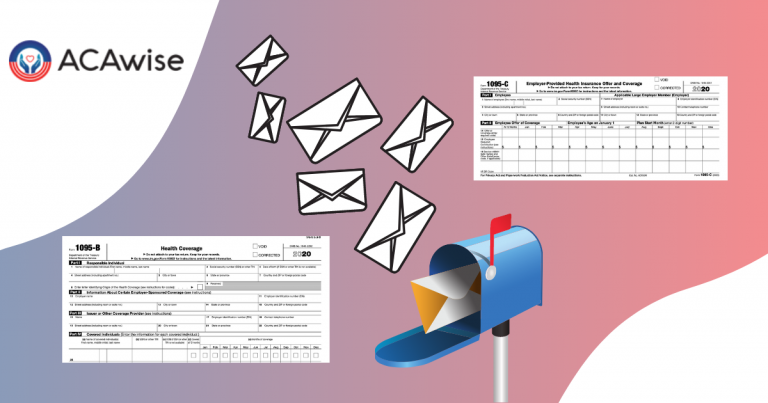Estimated reading time: 11 minute(s)

The ACA Reporting season has begun. If you are required to file ACA forms for the 2020 tax year, now is the time to begin the process, if you haven’t already done so. With the IRS deadlines approaching in March 2021, there is no time like the present.
Here is a guide to understanding the 2021 ACA reporting requirements for applicable large employers (ALE).
Who does the IRS require to report?
There are two sections of the IRS Code that layout who is required to report health insurance coverage information to the IRS.
Under Section 6055, any individual or organization that provides minimum essential health insurance coverage to individuals must report this information to the IRS and distribute this information to the recipients of said coverage.
Examples of these organizations include government-sponsored plans and individual market plans, even employer self-funded plans apply. These entities are generally required to file this information on Form 1095-B with the corresponding cover page, Form 1094-B.
Under Section 6056, any employer with 50 or more full-time/ full-time employees is required to provide minimum essential coverage health insurance and report this coverage both to the IRS and the respective employees.
These applicable large employers are generally required to file this information on Form 1095-C with the corresponding cover page Form 1094-C.
When are the deadlines for reporting?
The 2021 deadlines for reporting your 1095 Forms to the IRS and furnishing copies to your employees or recipients is the same regardless of whether you file Form 1095-B or 1095-C.
All recipient copies of Form 1095-B/1095-C must be distributed on or before March 2, 2021.
All paper filed forms must be filed with the IRS no later than February 28, 2021, however, if you choose to e-file, the forms are not due until March 31, 2021.
Please note that while e-filing is more convenient, it is not a chosen method if you are filing more than 250 returns. These organizations are required to file their forms electronically.
Are there any changes to reporting requirements for 2020?
Yes, there certainly are some changes that employers didn’t have to address on their 2019 ACA reporting. Most significant is the requirements concerning the ICHRA or Individual Coverage Health Reimbursement Arrangement.
This type of plan was introduced as an option for employers to offer their employees beginning in the tax year 2020. The ICHRA is an option where the employer provides reimbursements for certain healthcare expenses, in turn, the employee can choose a plan that accommodates their needs and price point.
Therefore, all employers who offered ICHRAs to their employees will have to report this specifically on their Forms 1095. There is an entirely new set of ACA Codes that refers to the ICHRA on Form 1095-C.
These codes consist of 1L-1S and are designed to report situations directly related to the ICHRA plan. Additionally, the ICHRA must be reported using the new code G on line 8 of Form 1095-B. You can find more information about these codes here.
There are some additional changes to Forms 1095 for 2021 for ICHRA reporting. There is a new line 17 on Form 1095-C for reporting your employees’ zip code. This is used to confirm the affordability of the ICHRA plan. Employers must also complete a new field, indicating the employees’ age on January 1.
Check out this video for more information.
Are you ready to get started?
ACAwise is here to help you tackle your ACA reporting requirements for the tax year 2020. The deadlines are approaching, so the time to act is now! Reach out to a member of our team today for more information and to discuss your own reporting requirements.
ACAwise offers a complete, full-service solution for your ACA reporting needs. Check out our ACA Core Services for a streamlined form generation and e-file solution. If you need ACA codes generated for you based on your employment records, check out our ACA Elite services. Both are completely customizable.



Leave a Comment